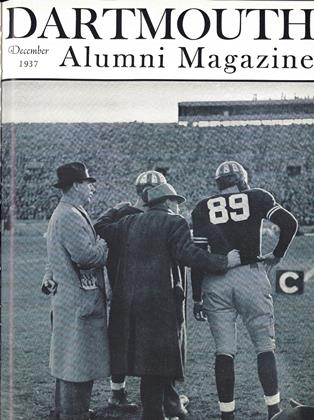This 1935 club likewise rolled along to murder Cornell 41-6, but then lost 26-6 to Princeton and utterly disheartened and discouraged, they dropped an anti-climactic affair to Columbia, 13-7. But that win from Yale, like Abou Ben Adam's love of his fellow man, more than made up for all the rest.
Last year, I'm not going to go into any detail about, for I'm sure its memory is still sufficiently fresh. Seniors now and grand footballers, brought along from freshman year all the way by the new staff, the 1936 Dartmouth team was one of the finest ever to wear the Green regimentals— and one of the unluckiest.
Their season, in case the figures have slipped your memory, was: Norwich, 58-0; Vermont 56-0, then they lost 7-0 to Holy Cross. Then they defeated Brown 34-0; Harvard 26-7; Yale 11-7; Columbia 20-13; Cornell 20-6 and finished in a tie with Princeton 13-13.
This is no alibi, is not for public dissemination, but is a personal and professional opinion stated within the family circle. That Dartmouth team wouldn't have been licked by Holy Cross, nor tied by Princeton—its two lone blemishes—if the officiating had been unchallengeable. The Princeton story, where a ruling against Dartmouth for interference on a forward pass play gave the Tigers the ball on Dartmouth's one yard line and a silver platter touchdown, is too well known to require any comment other than that pictures of the play show that Dartmouth didn't interfere and that the official, who's been in some historic jams before, merely made another bum guess which cost Dartmouth the immortal distinction of being the first team in all gridiron history to defeat Harvard, Yale and Princeton the same year.
The Holy Cross case is decidedly more theoretical, but failure to give Dartmouth forward progress on a certain play in that game set up the situation that led to that loss. It's all water under the bridge now, and power to the Crusaders whose sophomore flash, Bill Osmanski, intercepted a Dartmouth forward and galloped 85 yards to break up the pastime that day. But this is an analysis, and I'm merely trying to show you how narrow was the margin between the words "unusual" and "immortal" so far as that 1936 team was concerned. The story of this year's team is positively funny.
It may not be so funny by the time you're reading this, for the Cornell and Columbia games are yet to be played and Cornell, especially, is dynamite now that their key back. Peck, is physically fit. Furthermore, they've rested a week—that is, they didn't schedule a game for the Saturday before our meeting—so they ought to be in formidable shape.
But this was the team nobody expected anything from.
Last year was to be THE year, and it simply didn't happen.
FINAL RESTING PLACE OF THE JINX—BURIED TWO YEARS AGO
 View Full Issue
View Full Issue
More From This Issue
-
 Sports
SportsFollowing the Big Green Teams
December 1937 By "Whitey" Fuller '37. -
 Article
ArticleGradus Ad Parnassum
December 1937 By The Editor -
 Class Notes
Class NotesClass of 1914
December 1937 By Edward Leech -
 Class Notes
Class NotesClass of 1934
December 1937 By Martin J. Dwyer Jr. -
 Article
ArticleOld Families of Hanover
December 1937 By Eric P. Kelly 'O6 -
 Class Notes
Class NotesClass of 1935
December 1937 By William W. Titzhugh
Bill Cunningham '19
-
 Article
ArticleAND WHAT DOES IT MEAN?
December 1935 By Bill Cunningham '19 -
 Sports
SportsREBIRTH OF SPIRIT
December 1937 By Bill Cunningham '19 -
 Books
BooksWINGS IN THE NIGHT
November 1938 By Bill Cunningham '19 -
 Article
ArticleDistinctive Student Achievement
November 1941 By BILL CUNNINGHAM '19 -
 Article
ArticleWOMEN OF DARTMOUTH
February 1944 By BILL CUNNINGHAM '19 -
 Article
ArticleThe Indian Sharpens Up His Gridiron Tomahawk
February 1949 By BILL CUNNINGHAM '19
Sports
-
 Sports
SportsPENNSYLVANIA WINS BY TWO THIRDS OF A POINT
June 1921 -
 Sports
SportsNORWICH WRESTLERS WIN FROM DARTMOUTH
March, 1923 -
 Sports
SportsOtto Schniebs Resigns
May 1936 -
 Sports
SportsFollowing the Big Green Tearns
March 1931 By ROBERT P. FULLER '37 -
 Sports
SportsMISCELLANY
June 1949 By Roger K. Wolbast '43 -
 Sports
SportsBig Green Teams
June 1939 By Whitey Fuller '37

